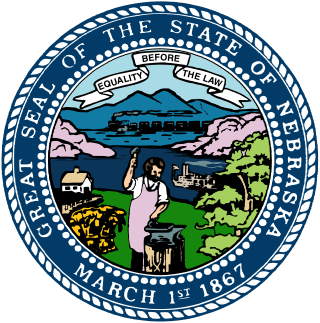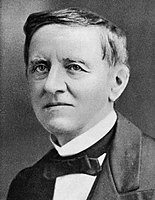
The 1876 United States presidential election was the 23rd quadrennial presidential election, held on Tuesday, November 7, 1876, in which Republican nominee Rutherford B. Hayes faced Democrat Samuel J. Tilden. It was one of the most contentious presidential elections in American history. Its resolution involved negotiations between the Republicans and Democrats, resulting in the Compromise of 1877, and on March 2, 1877, the counting of electoral votes by the House and Senate occurred, confirming Hayes as President. It was the second of five U.S. presidential elections in which the winner did not win a plurality of the national popular vote.

The 1876 Democratic National Convention assembled in St. Louis just nine days after the conclusion of the Republican National Convention in Cincinnati.

The 1876 United States presidential election in California was held on November 7, 1876, as part of the 1876 United States presidential election. State voters chose six representatives, or electors, to the Electoral College, who voted for president and vice president.

The 1876 United States elections were held on November 7. In one of the most disputed presidential elections in American history, Republican Governor Rutherford B. Hayes of Ohio ended up winning despite Democratic Governor Samuel J. Tilden of New York earning a majority of the popular vote. The Republicans maintained their Senate majority and cut into the Democratic majority in the House.

The 1968 United States presidential election in New York took place on November 5, 1968. All 50 states and the District of Columbia, were part of the 1968 United States presidential election. Voters chose 43 electors to the Electoral College, which selected the president and vice president.

The 1916 United States presidential election in New York took place on November 7, 1916. All contemporary 48 states were part of the 1916 United States presidential election. Voters chose 45 electors to the Electoral College, which selected the president and vice president.

The 1876 United States presidential election in New York took place on November 7, 1876. All contemporary 38 states were part of the 1876 United States presidential election. Voters chose 35 electors to the Electoral College, which selected the president and vice president.

The 1876 United States presidential election in Virginia took place on November 7, 1876, as part of the 1876 United States presidential election. Voters chose 11 representatives, or electors to the Electoral College, who voted for president and vice president.

The 1876 United States presidential election in Texas was held on November 7, 1876, as part of the 1876 United States presidential election. State voters chose eight electors to represent the state in the Electoral College, which chose the president and vice president.

The 1876 United States presidential election in Nebraska took place on November 7, 1876 as part of the 1876 United States presidential election. Voters chose three representatives, or electors to the Electoral College, who voted for president and vice president.

The 1876 U.S. presidential election occurred at the twilight of Reconstruction and was between Republican Rutherford B. Hayes and Democrat Samuel J. Tilden. After an extremely heated election dispute, a compromise was eventually reached where Hayes would become U.S. President in exchange for the end of Reconstruction and a withdrawal of U.S. federal troops from the South.

The 1876 United States presidential election in Tennessee took place on November 7, 1876, as part of the 1876 United States presidential election. Tennessee voters chose twelve representatives, or electors, to the Electoral College, who voted for president and vice president.

The 1876 United States presidential election in Alabama took place on November 7, 1876, as part of the 1876 presidential election. Alabama voters chose ten representatives, or electors, to the Electoral College, who voted for president and vice president.

The 1876 United States presidential election in Delaware took place on November 7, 1876, as part of the 1876 United States presidential election. Delaware voters chose three representatives, or electors, to the Electoral College, who voted for president and vice president.

The 1876 United States presidential election in Maryland took place on November 7, 1876, as part of the 1876 United States presidential election. Maryland voters chose eight representatives, or electors, to the Electoral College, who voted for president and vice president.

The 1876 United States presidential election in Mississippi took place on November 7, 1876, as part of the 1876 United States presidential election. Mississippi voters chose eight representatives, or electors, to the Electoral College, who voted for president and vice president.

The 1876 United States presidential election in North Carolina took place on November 7, 1876, as part of the 1876 United States presidential election. North Carolina voters chose 10 representatives, or electors, to the Electoral College, who voted for the president and vice president.

The 1876 United States presidential election in Florida took place on November 7, 1876, as part of the 1876 United States presidential election. Florida voters chose four representatives, or electors, to the Electoral College, who voted for president and vice president.

The 1876 United States presidential election in Iowa took place on November 7, 1876, as part of the 1876 United States presidential election. Voters chose 11 representatives, or electors, to the Electoral College, who voted for president and vice president.

The 1876 United States presidential election in Indiana took place on November 7, 1876, as part of the 1876 United States presidential election. Indiana voters chose 15 representatives, or electors, to the Electoral College, who voted for president and vice president.























